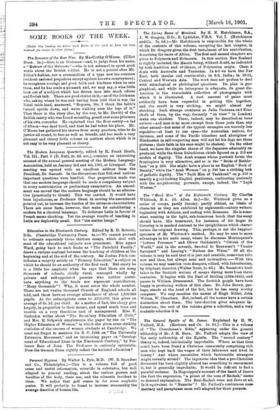Education in the Nineteenth Century. Edited by R. D. Roberts,
D.Sc. (Cambridge University Press. 4s.)—We cannot pretend to estimate separately these thirteen essays, which deal with most of the educational subjects now prominent. Miss Agnes Ward, going back to such books as "The Fairchild Family," draws a curious contrast between the teaching of children at the beginning and at the end of the century. Sir Joshua Fitch con- tributes a weighty article on "Primary Education," a subject on which he should be an authority of the first rank. But surely he is a little too emphatic when he says that there are many thousands of schools, chiefly rural, managed wholly by private and self-appointed persons who neither contri- bute anything to the funds nor represent contributors. "Many thousands" ! Why, it must cover the whole number. There are not twelve thousand Church of England schools all told, and these have an average attendance of about 1,800,000 pupils. As the subscriptions come to se600,000, this gives an average of 6s. 8d. per child. As a matter of fact, the clergy give largely, in proportion to their means, and spend much time and trouble on a very thankless task of management. Miss F. Gadesden writes about "The Secon lary Education of Girls," and Mrs. H. Sidgwick supplements the paper by one on "The Higher Education of Women," in which she gives some striking statistics of the success of women students at Cambridge. We must not forget to mention Sir R. C. Jebb on "The University Extension Movement," and an interesting paper on "Develop- ment of Educational Ideas in the Nineteenth Century," by Pro- fessor Rein of Jona. The Professor is curiously optimistic. Does the German Press rightly reflect the national education ?






































 Previous page
Previous page